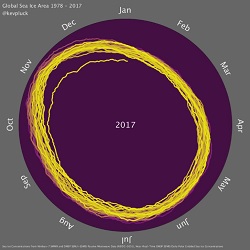
Time to Back Up the Public's Climate Data
With the Obama administration in its last weeks, the Washington Post reported “Scientists are frantically copying U.S. climate data, fearing it might vanish under Trump”. Especially if you have experience working with environmental data or policy, now is a good time to think about whether you’ve encountered any valuable climate or emissions datasets in danger of being swept away in the coming transition. Organizations like University of Toronto, University of Pennsylvania, and climatemirror.org are creating archives to offer permanent mirrors for these climate datasets.
Datasets held by federal agencies aren’t the only ones that could be at risk. Environmental journalists recently noticed that climate change information had been purged from a Wisconsin state government website. It’s worth protecting not just environmental information from federal agencies like the EPA and NOAA, but also state agencies like the Texas Commission on Environmental Quality, and even cities and counties.
If you want to find out whether a particular dataset is being backed up or what you can do to help, visit climatemirror.org for a list of existing mirrors and a Google Doc showing which datasets are in progress. Some tools for archiving government websites are available from climatemirror and a University of Toronto Github page. Alternatively, if your dataset is hotter than Texas in 2050 under a business-as-usual emissions projection, maybe you’d prefer to tell archivists about it privately. The Environmental Data & Governance Initiative is soliciting help accessing “environmental data that is not freely available on the web” via its encrypted email address.
If you’re interested in a more local dataset that’s outside the scope of the mirroring projects listed here, or if you have a plan to create something with the data beyond just backing it up, consider bringing your project idea to Open Austin. You can submit your idea as an issue on our Github group’s project-ideas page or look for collaborators at one of our Civic Hack Nights.
Open Austin can also be a resource for environmental data consumers who want to encourage governments to release new datasets, or to keep their existing data more timely or accessible. Contact us on the #policy channel of our Slack group if you have an issue you’d like to add to our advocacy agenda for 2017.
Continue the Conversation
Join the Open Austin community on Slack: Get an invite
RSVP for our future events on Meetup: RSVP
Follow us on Twitter
& Like us on Facebook